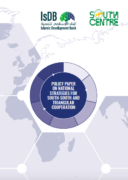National Ecosystems
South-South and Triangular Cooperation: lessons from partnership between Argentina and Mozambique
By Federico Villegas
This article reviews some fruitful South-South and Triangular Cooperation (SSTrC) initiatives between Argentina and Mozambique. The initiatives received political support from both countries and showed that the relationship between South-South Cooperation and Triangular Cooperation can be mutually reinforcing. SSTrC may channel financial resources from development partners to projects and initiatives that can produce highly effective development results.
(more…)
IsDB and South Centre Advocate for Development of National Strategies for South-South and Triangular Cooperation
By the Islamic Development Bank

Jeddah, Kingdom of Saudi Arabia, 06 May 2021 – The Islamic Development Bank (IsDB) and the Geneva-based South Centre have strongly advocated for the formulation of national strategies for South-South and Triangular Cooperation.
The two institutions made the call in a joint policy paper on National Ecosystems for South-South and Triangular Cooperation (SSTrC) titled ‘Policy Paper on National Strategies for SSTrC.’ The joint policy paper developed a framework on how to formulate the SSTrC strategies.
(more…)
Policy Paper on National Strategies for South-South and Triangular Cooperation
For developing countries to realize the full potential of South-South and Triangular Cooperation (SSTrC) for achieving their national sustainable development objectives, it is important to formulate national SSTrC strategies as part of their national SSTrC ecosystems. Such national strategies would serve as guidance for a country’s SSTrC activities, initiatives and institutional framework, both as provider and beneficiary of SSTrC. This policy brief highlights the importance of developing national SSTrC strategies for achieving national development objectives and lays out the main elements that can be taken into consideration by developing countries for designing their national SSTrC strategies. While many developing countries do not have an explicit SSTrC strategy in place yet, the state of play shows that its elements can be found in various policies, institutional guidance and national development strategies. The absence of a holistic approach and a nationally acknowledged strategy carries the risk of fragmentation and incoherence in undertaking SSTrC activities. The potential of national SSTrC strategies for enabling effective responses to crises (such as COVID-19) is also explored.
This paper was developed jointly by the Islamic Development Bank (IsDB) and the South Centre based on the concept of the Islamic Development Bank on National Ecosystems for South-South and Triangular Cooperation.
(more…)
Assessment Framework for National Ecosystem for South-South and Triangular Cooperation
The South Centre provided instrumental technical feedback for the development of the Islamic Development Bank (IsDB)’s NEW publication Assessment Framework for National Ecosystem for South-South and Triangular Cooperation.
(more…)
Reverse Linkage: IsDB’s Role in Deploying the Power of South-South Cooperation to Tackle COVID-19 Pandemic
Message from H.E. Dr. Bandar M. H. Hajjar, President, Islamic Development Bank (IsDB) Group, on the occasion of the United Nations Day for South-South Cooperation
(more…)
Developing National Ecosystems for South-South and Triangular Cooperation to Achieve Agenda 2030 for Sustainable Development
To maximize the benefits of South-South and Triangular Cooperation (SSTrC), it would be imperative to have an effective “national ecosystem” – an institutional framework at national level. Over the years, the pace of institutional improvements in conducting SSTrC by Southern countries has lagged far behind the fast expansion of SSTrC in size, making it a constraint for unleashing the full potential of SSTrC. On 26 September 2019, the Islamic Development Bank (IsDB), the South Centre and the United Nations Office for South-South Cooperation (UNOSSC) launched the joint publication entitled “Developing National Ecosystems for South-South and Triangular Cooperation to Achieve Agenda 2030 for Sustainable Development” on the side lines of the 74th session of the United Nations General Assembly in New York. It discusses how to strengthen national ecosystems to promote SSTrC. The concept of national ecosystem advocates a bottom-up and incremental approach. It emphasizes that the national ecosystem is not meant to be prescriptive or a one size fits all model. Developing an effective national ecosystem for SSTrC requires understanding of the national realities and objectives and takes time, effort, commitments and financing.
(more…)
The Importance of “Developing National Ecosystems for South-South and Triangular Cooperation to Achieve Agenda 2030 for Sustainable Development” – on the occasion of launching the publication
By Yuefen LI
To maximize the benefits of South-South and Triangular Cooperation (SSTrC), it would be imperative to have an effective “national ecosystem” – an institutional framework at national level. Over the years, the pace of institutional improvements in conducting SSTrC by Southern countries has lagged far behind the fast expansion of SSTrC in size, making it a constraint for unleashing the full potential of SSTrC. On 26 September 2019, the Islamic Development Bank (IsDB), the South Centre and the United Nations Office for South-South Cooperation (UNOSSC) launched the joint publication entitled “Developing National Ecosystems for South-South and Triangular Cooperation to Achieve Agenda 2030 for Sustainable Development” on the side lines of the 74th session of the United Nations General Assembly in New York. It discusses how to strengthen national ecosystems to promote SSTrC. The concept of national ecosystem advocates a bottom-up and incremental approach. It emphasizes that the national ecosystem is not meant to be prescriptive or a one size fits all model. Developing an effective national ecosystem for SSTrC requires understanding of the national realities and objectives and takes time, effort, commitments and financing. (more…)
Statement by Dr. Carlos Correa, Executive Director of the South Centre, at the Second High-Level United Nations Conference on South-South Cooperation (BAPA+40), Plenary
Buenos Aires, March 2019
The South Centre is pleased to participate in this very important Conference. Established in 1995 as an intergovernmental think tank for the developing countries, the South Centre is in itself a manifestation of South-South cooperation. It remains wholly committed to its mandate of promoting the common interests among the countries of the South, while recognising their diversity. The Centre was created by the South and works to enhance policy coordination and cooperation of the South.
(more…)













